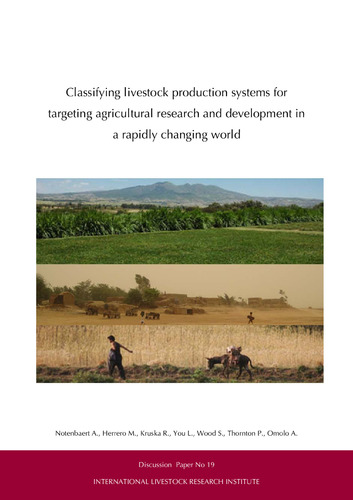Classifying livestock production systems for targeting agricultural research and development in a rapidly changing world
Abstract
A myriad of agricultural and livestock production systems co-exist in the developing countries. Agricultural research for development should therefore aim at delivering strategies that are well targeted to the heterogeneous landscapes and diverse biophysical and socioeconomic contexts the agricultural production system is operating in. To that end, in the recent past several approaches to spatially delineate landscapes with broadly similar production strategies, constraints and investment opportunities, have been applied. The mapped Seré and
Steinfeld livestock production classification, for example, has been widely used for the targeting of pro-poor livestock intervention within ILRI. In this paper we describe potential methodologies for the inclusion of crop-specificity and intensification in the existing Seré and
Steinfeld livestock systems classification. We also present some first broad-brush future
projections of these detailed crop-livestock production systems. A number of example applications are discussed and recommendations for future improvement and use are made.
While the production system classifications are especially useful for bio-physical applications such as livestock-environment interactions and feed assessments, the links with socioeconomic factors still need to be explored further. Also, it is only one of the necessary building blocks for better targeting of research and development efforts. We, however,believe that the proposed system classifications will be of use to a variety of agricultural and livestock scientists and development agents alike. In addition, they serve as practical
examples making the case for the use of spatial stratification when targeting agricultural research and development.

